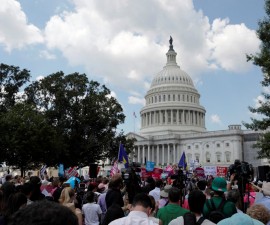HARI SREENIVASAN, PBS NEWSHOUR WEEKEND ANCHOR: For more analysis of the health care debate, "NewsHour Weekend" special correspondent Jeff Greenfield joins us from Santa Barbara, California.
Jeff, here we are, a sixth of the U.S. economy depends on healthcare and we have a piece of legislation that could be decided by maybe two, three votes, it's coming down to this?
JEFF GREEENFIELD, PBS NEWSHOUR WEEKEND SPECIAL CORRESPONDENT: Yes, and it's remarkable. You know, in the old days, big social legislation like Social Security and Medicare used to pass by overwhelming margins. But for the last 25 years, we've seen this down to the wire kind of situation. Clinton got his tax bill through with a one or two-vote margin. President George W. Bush got his prescription drug plan through the House with one vote to spare. Obama's stimulus and his healthcare bill needed 60 votes in the Senate to overcome a filibuster. That's exactly what's he got.
So, that's what has happened and that reflects I think, in part, political polarization. But there's also something to remember, all those bills passed because members of the president's party in Congress are very reluctant to see the president fail.
SREENIVASAN: This idea of party versus country and what you should put first, how does it play out in this vote?
GREENFIELD: I think you can see it dramatically with Senator Dean Heller of Nevada, who is the most endangered Republican senator next year in the midterms. With the prodding of the Republican governor, he has said he's no on this bill because of Medicaid. So, what's happening, a pro-Trump PAC is going to launch a seven-figure media buy against him. And what happens now is for him and for the other Republicans who expressed reluctance. What it comes down to is Mitch McConnell looking for ways to pacify them with concessions at the last minute and the problem, of course, is that any time you concede to the moderates, the conservatives don't like it and vice versa.

SREENIVASAN: All right. From politics to policy, when you look into the meat of it, whether it's the House version or the Senate version, you have these huge constituencies that are going to be hurt by it — the poor, the elderly. Who wins going forward or is this just a calculation of figuring out the bare minimum to get it over the line?
GREENFIELD: Look, I think what you — every independent analysis says this is big distribution away from middle class and the poor toward the affluent, who got hit in the Obama plan because their taxes were increased to pay for the subsidies.
But two things to remember: first, the tax cuts kick in immediately. The bites with Medicaid expansion later and reduced subsidies and higher premiums, they don't begin to kick in until after the 2018 midterms. I think that's a very critical point.
The second thing I'd say is that for a lot of Republican base, repealing Obamacare, whatever that means, has become the be all and the end all. It's like Vince Lombardi once said, winning this and everything, it's the only thing. Anything they can call Obama repeal, they want, because not to do it betrays the central promise they made to the Republican base.
SREENIVASAN: Shifting gears a little bit, the president back on Twitter. In a couple of tweets, he seems to acknowledge the Russian interference in the context of blaming the Obama administration for not doing anything about it, which is a different tactic than what the White House and the administration and President Trump has been pushing with the past few months.
GREENFIELD: So, for months, Donald Trump was saying there is nothing to the story of hacking. Maybe it's the Chinese. Maybe it's some guy in his parents' basement. Now, he seems to be he's saying, of course, there was hacking, and the reason the Obama administration didn't talk about it much was to help Hillary by not talking about it.
That makes no sense. Had they exposed Russian effort to push the electorate away from Hillary, that would have helped her politically. And one of the reasons they didn't do it, according to the intelligence chiefs that served Obama was, had they raised that issue, they would have been accused of politicizing the story in an effort to help Hillary Clinton.
I think it's an illustration also, more broadly, of how Trump uses social media, to convince his millions of followers that his version of reality is right and, by definition, anyone pushing back against that story is a product of fake news. And I think that's just become a kind of running theme of this administration. There's no reason to think it's going to stop.
SREENIVASAN: All right. Jeff Greenfield joining us from California — thanks so much.
GREENFIELD: Thank you.












